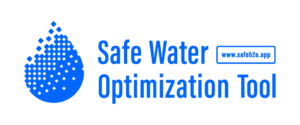
Humanitarian operations have little in place to ensure that water quality complies with safety guidelines at the point of consumption, a significant oversight in response efforts.
Chlorination is the most widely practised water treatment technique used to supply safe water to refugees and internally displaced persons. If well managed, it can ensure residual contamination protection from the point of water dispensation to the point of water consumption in the household.
Humanitarian agencies prioritize water safety and routinely collect, monitor and report residual chlorination data. Little is done, however, to leverage this information to ensure that water quality complies with safety guidelines at the point of consumption, a significant oversight in response efforts.
The proper management and analysis of routinely collected residual chlorine data, using appropriate statistical techniques, will provide humanitarian field workers with high-quality, site-specific, and evidence-based operational guidance. The Safe Water Optimisation Tool (SWOT) is being developed with this primary objective. It aims to:
- Improve public health by reducing the incidence of water borne disease
- Establish site-specific guidance to ensure stricter compliance with chlorination standards at the household level
- Improve accountability to populations and donors
- Highlight problematic areas or practices towards which resources can be focused during water supply interventions or outbreak control
With Médecins Sans Frontières / Doctors Without Borders
You may also be interested in...
York University funds $4.05M to support interdisciplinary research for the UN SDGs
The research projects advance knowledge in areas ranging from water remediation, management of infectious disease through technological innovation, the effects of climate change on ecosystems and human populations, visual neuroscience, and understanding the pathway from ...Read more about this Post
Upcoming Webinar Series on Climate Change and Global Occupational Health and Safety
The Dahdaleh Institute for Global Health Research, Global Labour Research Centre, and ReSTORE (University of Toronto) are proud to cosponsor CIFAL York's new Climate Change and Global Occupational Health and Safety speaker series. Climate change ...Read more about this Post
Recap – Systematic Reviews and Meta-Analysis Workshop Enhance Interdisciplinary Research Skills
Professor Godfred O. Boateng and Professor Reginald Quansah (from the University of Ghana) led a hybrid four day-workshop on systematic reviews and meta-analysis from Tuesday, February 20th to Friday, February 23rd. With participants joining from ...Read more about this Post
